七年级英语上册第27讲期末串讲一同步基次程讲义新版牛津版
广州牛津版7年级上 UNIT1 reading Anna27s blog讲课教案
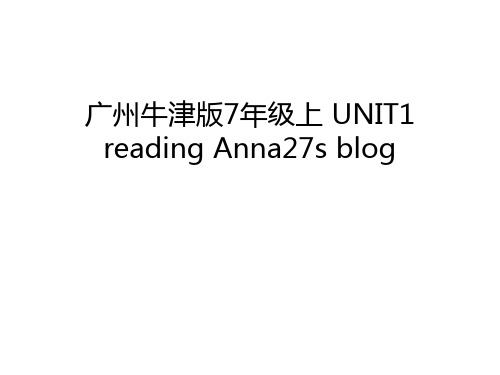
WWaetcchatnheinptrieocdeuoefovuidreforiaennddsthfirnokmabout how ttohientfrooldlouwceinygoausr pfreiecntsd:and yourself.
Favourite subjects: _M__a_th_s_, _A__r_t _ and Science
Hobbies: _s_w_i_m_m__i_g_ and playing _b_a_s_k_e_tb_a_l_l Dream: to be an _e_n_g_in_e_e_r__
p4 C1
all over close to friendly good at hobbies
We welcome young people from __a_ll__o_v_er__ the world. Please email us your answers to these questions:
Do you know the meanings of the red words and phrases? Find out the correct answers.
1. Hello, everyone.
a all people b some people
2. I live with my family in a house close to some mountains.
a near
b far away from
3. I like my school because the teachers are
all very friendly.
a happy
上海牛津七年级英语上册完美讲义完整版
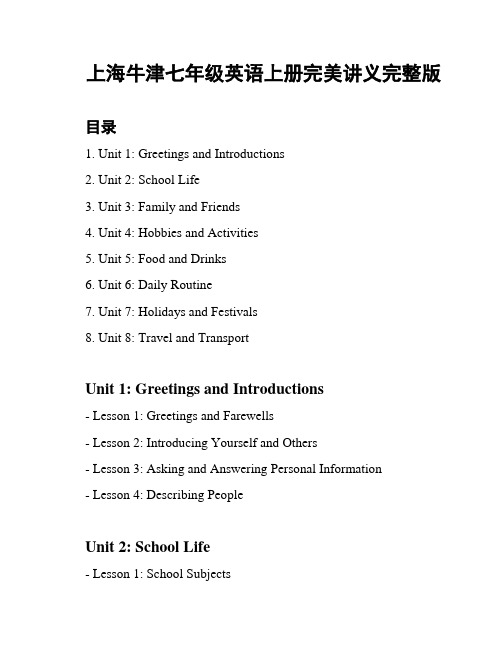
上海牛津七年级英语上册完美讲义完整版目录1. Unit 1: Greetings and Introductions2. Unit 2: School Life3. Unit 3: Family and Friends4. Unit 4: Hobbies and Activities5. Unit 5: Food and Drinks6. Unit 6: Daily Routine7. Unit 7: Holidays and Festivals8. Unit 8: Travel and TransportUnit 1: Greetings and Introductions- Lesson 1: Greetings and Farewells- Lesson 2: Introducing Yourself and Others- Lesson 3: Asking and Answering Personal Information- Lesson 4: Describing PeopleUnit 2: School Life- Lesson 1: School Subjects- Lesson 2: Classroom Objects- Lesson 3: School Facilities- Lesson 4: Talking about TimetablesUnit 3: Family and Friends- Lesson 1: Talking about Family Members - Lesson 2: Describing People's Appearance - Lesson 3: Discussing Family Activities- Lesson 4: Talking about FriendsUnit 4: Hobbies and Activities- Lesson 1: Talking about Hobbies- Lesson 2: Sports and Activities- Lesson 3: Inviting and Accepting Invitations - Lesson 4: Talking about PlansUnit 5: Food and Drinks- Lesson 1: Food and Drinks Vocabulary- Lesson 2: Ordering Food in a Restaurant- Lesson 3: Talking about Preferences- Lesson 4: Describing FoodUnit 6: Daily Routine- Lesson 1: Talking about Daily Activities- Lesson 2: Telling the Time- Lesson 3: Daily Routines and Schedules- Lesson 4: Talking about Habits and FrequencyUnit 7: Holidays and Festivals- Lesson 1: Talking about Holidays and Festivals- Lesson 2: Celebrations and Traditions- Lesson 3: Discussing Special Occasions- Lesson 4: Talking about Future PlansUnit 8: Travel and Transport- Lesson 1: Modes of Transport- Lesson 2: Giving Directions- Lesson 3: Asking for and Giving Travel Information - Lesson 4: Talking about Past Travel Experiences以上是《上海牛津七年级英语上册》的完美讲义完整版。
2024-2025学年牛津译林版七年级英语上册

Personal
Singular (单数)
Plural (复数)
第三人称
Personal pronouns(obejct form)
Singular (单数)
Plural (复数)
第一 第二 人称 人称
me you him
第三人称 her it
8. We shouldn’t chat with _________ (他们)in class. We should listen t
teacher carefully.
The answers: 1. her she 2. them 3. She
4. They 5. him 6. He
7. us
8.
阴性代词 she,her 的用法
阴性代词 she,her 可用来指代“国家、车、船、飞机”等物,以示 亲切,但应注意不要滥用。
人称代词的类指用法
人称代词能够表示类指,即泛指一般的人或事物。
(1)we 和 you 表示类指时,泛指一般人,包括听说双方在内。 例如:Think before you act.三思而后行。 (2)they 表示类指时,一般指有关方面,不包括听说双方在内。 例如:I don’t think they will raise the price of oil.
Exercises: choose
1. ________ is hard for _____ to finish the task in such a short time.
A. It; him B. It; he C. This; she D. This;her
2. ---Who can try to solve this problem?
201x版七年级英语上册第26讲Unit8Fashion习题课同步基次程讲义新版牛津版
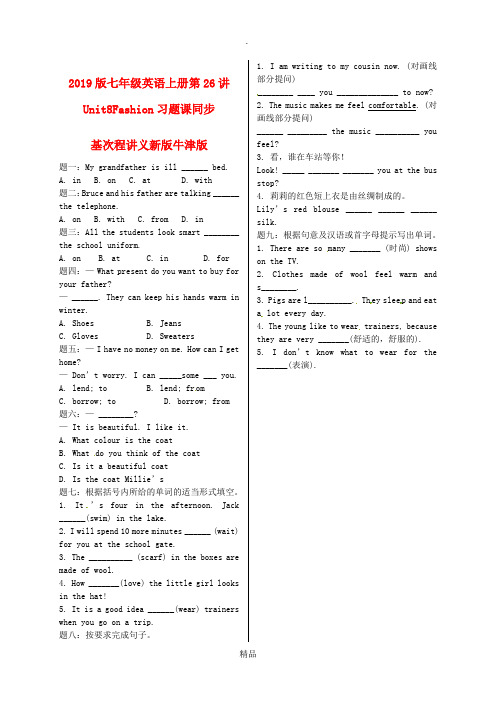
2019版七年级英语上册第26讲Unit8Fashion习题课同步基次程讲义新版牛津版题一:My grandfather is ill ______ bed. A. in B. on C. at D. with题二:Bruce and his father are talking ______ the telephone.A. onB. withC. fromD. in题三:All the students look smart ________ the school uniform.A. onB. atC. inD. for 题四:—What present do you want to buy for your father?— ______. They can keep his hands warm in winter.A. ShoesB. JeansC. GlovesD. Sweaters题五:—I have no money on me. How can I get home?—Don’t worry. I can _____some ___ you.A. lend; toB. lend; fr omC. borrow; toD. borrow; from 题六:— ________?— It is beautiful. I like it.A. What colour is the coatB. What do you think of the coatC. Is it a beautiful coatD. Is the coat Millie’s题七:根据括号内所给的单词的适当形式填空。
1. It’s four in the afternoon. Jack ______(swim) in the lake.2. I will spend 10 more minutes ______ (wait) for you at the school gate.3. The __________ (scarf) in the boxes are made of wool.4. How _______(love) the little girl looks in the hat!5. It is a good idea ______(wear) trainers when you go on a trip.题八:按要求完成句子。
Unit1同步讲义2023-2024学年上海牛津版英语七年级上册
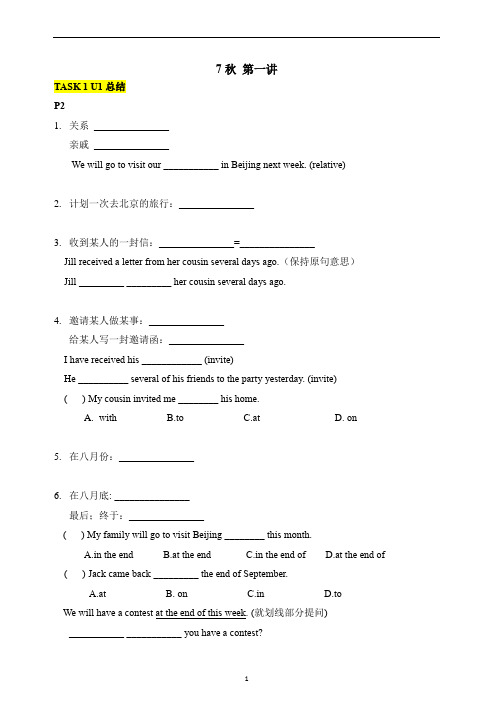
7秋第一讲TASK 1 U1总结P21.关系_______________亲戚_______________We will go to visit our ___________ in Beijing next week. (relative)2.计划一次去北京的旅行:_______________3.收到某人的一封信:_______________=_______________Jill received a letter from her cousin several days ago.(保持原句意思)Jill _________ _________ her cousin several days ago.4.邀请某人做某事:_______________给某人写一封邀请函:_______________I have received his ____________ (invite)He __________ several of his friends to the party yesterday. (invite)( ) My cousin invited me ________ his home.A.withB.toC.atD. on5.在八月份:_______________6.在八月底: _______________最后;终于:_______________( ) My family will go to visit Beijing ________ this month.A.in the endB.at the endC.in the end ofD.at the end of ( ) Jack came back _________ the end of September.A.atB. onC.inD.toWe will have a contest at the end of this week. (就划线部分提问)___________ ___________ you have a contest?7.以前;用现在完成时: _______________( ) I ________ the man somewhere before.A.seeB. sawC.am seeingD. have seen8.寄给某人某物: _______________=_______________My sister sent me a photo of her.(保持原句意思)My sister _______ a photo of her ________ me.9.可能地: _______________=_______________=_______________=_______________10.贵的:_______________便宜的:_______________更贵的:_______________最贵的:_______________His computer is ____________(expense) than mine.The food in the supermarket is cheap, but it’s much __________ in the market.(cheap)11.有趣的:_______________感兴趣的:_______________对(做)某事感兴趣: _______________名胜古迹: _______________兴趣; 使感兴趣:_______________Mr. Wu told us an __________ (interest) story.He is very _______ in playing the piano. He thinks it is _______(interest).12.6种提建议的方法:对提建议的回答:All right/ok/good idea/sounds good等( ) A:________ we take Underground Line1? B:That’s a good idea.A.WillB. DoC. ShallD. CanWhat about visiting the Summer Palace next week? (保持原意)_________ _________ visit the Summer Palace next week?Let’s go to see a film together, ___________ ___________?(改为反义疑问句)13.和某人交谈:谈论关于…的事情:( ) Shall we talk _________Mum _________ our plan?A.to/ withB. with/ aboutC. with/ toD. about/ with( ) Mary is talking ___________ her parents ___________ their trip to Beijing.A. with ; forB. to ; aboutC. to ; withD. with ; of14.从…得到一些手册:_______________( ) Kitty got a letter _________ her grandma yesterday.A.fromB.inC. onD.to15.代理人: _______________代理处:_______________在旅行社: _______________A:Where is Mr Li? B:He is at the travel __________.(agency)I will go to meet the travel __________ tomorrow. (agency)( ) Mike works as a travel _________ .A.agencyB. agentC. agent’sD. agency’sMr. and Mrs. Li are at the travel ___________office to ask for some information for their trip to Beijing. (agency)16.很快;用一般将来时: _______________多久以后; 对in+一段时间的提问:_______________( ) Uncle Li __________ our family soon.A.visitsB. has visitedC. visitedD.is going to visitP31.想要做某事:_______________=_______________He’d like to buy a new mp3.(保持原句意思)He _______ ________ buy a new mp3.()Would you like _________ us in Garden City?A.visitB. visitedC.to visitingD.to visit2.乘飞机去某地:_______________=_______________=_____________=_____________ ( )You can travel to Hainan Island __________.A.by a planeB. take a planeC. take airD.by airWe went to the Science Museum by underground. (保持原句意思)We ___________ the underground ___________ the Science Museum.3.how long: _______________;_______________;_______________It is 300 metres from this shop to that one.(对划线部分提问)_________ _________ is it from this shop to that one?It takes more than 10 hours to travel to Britain by plane. (对划线部分提问)___________ ___________ does it take to travel to Britain by plane?( ) ___________ does it take to travel from Shanghai to London by plane?A. How longB. How oftenC. How soonD. HowThey are going to stay in Shanghai for one month. (就划线部分提问)___________ ___________ are they going to stay in Shanghai?4.两个半小时: _______________=_______________( )The film lasted _________ .A. a hour and a halfB. a half and an hourC. an hour and halfD.an hour and a half( )It takes about __________ to travel from Shanghai to Beijing.A. four hours and halfB. four and half hoursC. four and a half hoursD. four hour and a half5.对价格的提问:_______________ =_______________ =_______________( ) How much did this ticket ________ ?A.spendB. takeC. costD. payThe plane tickets costs me 2000 yuan. (就划线部分提问)___________ ___________ does the plane tickets cost you?6. 花费时间:_______________ =_______________( ) It takes me ten minutes ___________ from my home to school every day.A. to walkB. walkingC. walkD. to walking I spent 300 dollars on the new computer last week. (保持原句意思)The new computer ___________ ___________ 300 dollars last week.P41.在八月16号:_______________( ) ________ August8, 2008, the 29th Olympic Games were held in Beijing.A. InB. AtC. OnD. Of( ) We will go to Beijing ________ the eleventh of September.A.toB.inC. onD. forWe are going to visit Beijing on 16 August.(对划线部分提问)__________ __________ you going to visit Beijing?2.到达那儿:_______________=_______________=_______________3.谢谢某人的…: _______________谢谢你的帮助:_______________=_______________谢谢你的邀请函:_______________=_______________感激的: _______________对某人是感激的: _______________Thank you for ___________ us to visit you. (invitation).( ) Thank you for _________ me a lovely present.A.sendB. sendingC.to sentD. senting( ) Thank you ___________ the Christmas card and the gift.A. aboutB. fromC. ofD. forP51.欢迎到某地:_______________2.姓李的一家人:_______________=_______________3.到达北京:_______________=_______________=_______________( ) When did he _________ home last night?A.arrive atB. arrive inC. reachD. get toThe students got to the Palace Museum at eight o’clock. (保持原句意思)The students ___________ ___________ the Palace Museum at eight o’clock.( ) The Li family has arrived in the U.S.A. The underlined part means:___________.A. reachedB. got D. arrived at D. reached to4.带某人去某地: _______________( ) Did Jane _______ you to the hospital________ Friday afternoon?A.take, inB. bring, inC. take, onD. bring, on( )7.When will the ship ________?A.arriveB. arrive inC. reachD. get to5.一些关于…的信息:_______________6.在北京的西北边(在内部):_______________7.许多的古老建筑和寺庙:______________________________There were many ancient ___________ in Shanghai twenty years ago. (build)8.看见天鹅在湖上游:______________________________You can see swans ___________ on the lake. (swim)We can see children ___________ kites in the park. (fly)9.在长城:_______________( ) Hangzhou is famous for _______ West Lake.A.aB.anC. theD./10.上面有塔的长墙:______________________________( ) Suzhou is a famous place ___________ a lot of old buildings and temples.A. haveB. hasC. inD. with11.很久以前:_______________12.用砖块和石头:_______________( ) People built the Great Wall ________ bricks and stones.A.withB.atC. forD.in13.在天安门:_______________( ) I hope I can visit ___________ Tianan’men Square and ___________ Great Wall.A. the ; /B. / ; theC. the ; theD. / ; /( ) We can see many tourists ___________ Tian’anmen Square.A. inB. atC. onD. to14.在…的中心:_______________=_______________( ) You can find People’s Square ___________ the center of Shanghai.A. inB. atC. onD. to15.一个大的开放区域:_______________( ) There’s _________ grass in People’s Square.A.an open areaB. open areaC.an open area ofD. open area of16.容纳:_______________( ) The bus can ___________ 50 passengers.A.have B has C. hold D. give( ) Tian’anmen Square is large enough to ___________ more than one million people.A. bringB. takeC. haveD. hold17.超过一百万的人:_______________( ) More than one hundred people died in the accident. The underlined part means: ___________.A. overB. fewerC. aboutD. less than18.升中国国旗:______________________________We love our motherland. We love our __________flag. (nation)Please write it in ___________. (China)Paris is an ___________ city. (nation)Do you know the ___________ of our English teacher? (nation)19.在故宫: _______________( ) Have you ever been to __________ Summer Palace?A./B. aC. theD.an20.中国的历史: _______________21.旅行:_______________游客: _______________=_______________Look! There’re a lot of __________ in the park. (tour)The __________ come from Shanghai. (visit)P71.玩的开心:_______________=_______________=_______________They are having a great time on the island.(改为感叹句)_________ _________ great time they are having on the island!( ) We always enjoy ________ on holidays.A.themselvesB. myselfC. ourselfD. ourselvesThey had a good time at the party last night. (保持原意)They _________ _________ at the party last night.2.绝妙的;极好的:_______________绝妙地:_______________奇迹: _______________v. 想知道(=want to know)The book is ____________ than that one. (wonder)3.一张你和我的照片:_______________It is a photo of ___________ and me.(your)Here are some _____________ for you. (photo)( )2.These New Year cards are for __________.A.you and meB.me and youC. you and ID.I and you4.在…前面(范围外): _______________在…前面(范围内):_______________PracticeI. Complete the sentences with the proper forms of the given words (用所给单词的适当形式填空)1. Last Friday, Mr. Smith came to the estate ____________ and found some information. (agent)2. My aunt has ____________ us to her home. (invitation)3. A lot of ____________ come to visit Shanghai every year. (tour)4. Listen, Langlang is playing the piano ____________. (wonder)5. There are many beautiful ____________ on both sides of the road. (build)6. More and more ____________ come to visit Beijing recently. (visit)7. Simon has got some ____________ for you, Lucy. (photo)8. I’m ____________ in Music. (interest)9. Simon and Lucy showed their cousins many ____________ places in Beijing. (interest)10. There are many big ____________ in the world. (city)II. Complete the sentences with proper words. The first letters are given. (用适当的单词完成句子,首字母已给)1.Travelling by plane is not cheap. It is e_________.2.We can see soldiers r_______ the Chinese national flag at Tian’anmen Square.3.The children are planning to visit different places of i_______ in Beijing.4.The Palace Museum has a long history. And there are many a_______ buildings in it. 5.The summer holidays are coming. I want to i_____ my cousins to come to Shanghai.III. Translate the following sentences into English (将下列句子翻译成中文)1. 我已收到一封来自Mike的来信。
七年级上册lesson27知识点

七年级上册lesson27知识点七年级英语上册的第27课是关于“谈论不同的体育运动”这一主题的,学生们需要掌握一些相关的知识点,从而更好地理解和运用本课的内容。
本文将详细讲解这些知识点,帮助读者更好地掌握本课内容。
一、词汇1. Sports(运动):当我们谈论运动时,我们需要学习一些与运动相关的词汇。
比如说,“basketball”(篮球)、“football”(足球)、“table tennis”(乒乓球)等等。
这些词汇是本课中必须掌握的。
2. Adjectives(形容词):当我们描述一个运动或一位运动员时,我们需要使用形容词。
例如,“exciting”(刺激的)、“skilled”(技术高超的)、“athletic”(运动员特有的)等等。
同样,这些词汇也是本课中必须掌握的。
3. Verbs(动词):当我们描述运动时需要使用一些特定的动词。
例如,“play”(打)、“score”(得分)、“shoot”(射门)等等。
这些词汇也是本课中必须掌握的。
二、语法1. 物主代词:在本课中我们会涉及到物主代词的使用。
物主代词包括“my”(我的)、“your”(你的)、“his”(他的)等等。
我们需要使用这些代词来描述运动员或运动装备的归属。
2. 祈使句:当我们邀请别人一起参加运动时,常常需要使用祈使句。
例如,“Let’s play basketball!”(让我们一起打篮球!)。
祈使句是本课中需要掌握的语法知识之一。
三、阅读理解在本课中,学生将会阅读一篇关于活力健身运动中心的文章。
学生需要理解文章中的信息并且回答相关问题。
这对于学生的阅读理解能力和语言水平是很有帮助的。
因此,学生需要着重理解文字表述的含义,并对其中提到的关键信息进行分析。
本文所列举的知识点不是本课所有需要掌握的知识点,但对于学生理解和掌握本课内容仍然是很有帮助的。
因此,学生应该在学习本课时认真对待这些知识点,并加以实践和运用。
只有当学生真正掌握了这些内容,才能更好地理解和运用本课所教授的知识。
最新牛津版英语初中七年级上册全册精品教案

最新牛津版英语初中七年级上册全册精品
教案
第一单元:打招呼与自我介绍
教学目标:
- 学会用简单的英语打招呼和自我介绍
- 掌握一些常见的问候语和回答方式
- 能够用英语介绍自己的年龄、姓名、国籍和爱好
教学准备:
- 学生课本和练册
- 教学投影仪
- 音频设备
教学步骤:
1. 引入:播放英语打招呼的视频,让学生感受英语在生活中的应用。
2. 激发学生兴趣:用图片和肢体语言示范常见的问候动作,如握手、拥抱等,并鼓励学生模仿。
3. 研究常见问候语:通过图片和示范,教授英语中常见的问候语,如"Hello","Good morning"等,并让学生跟读。
4. 听力训练:播放相关音频,让学生听力理解和模仿说出各种问候语。
5. 练对话:分成小组进行对话练,让学生用英语进行简单的问候和回答。
6. 自我介绍:示范用英语进行自我介绍,并解释一些常用的句型和词汇。
7. 小组活动:让学生在小组内互相介绍自己的姓名、年龄、国籍和爱好,并鼓励用完整的句子进行表达。
8. 温故知新:通过游戏或练册的相关练,巩固所学内容。
9. 总结:引导学生总结本课所学内容,并鼓励他们在日常生活中多用英语进行问候和介绍。
教学评估:
- 观察学生在对话和小组活动中的表现,评估他们是否能够正确运用所学内容。
- 检查练册上的完成情况,了解学生的掌握程度。
扩展活动:
- 邀请外教或英语达人来校与学生进行互动交流,进一步提高他们的英语口语能力。
- 给学生布置任务,让他们到校园或社区中用英语与陌生人进行简单的交流。
7.2 Grammar(同步课件)-七年级英语上册同步精品课堂(牛津深圳版)

Weform the simplepast tense like this:
Type of verb
Simple past form
Example
Most verbs
+ed
walk →walked
Verbs ending in -e +d
Verbs ending in a y+ied consonant letter +y
too.But,I(6) dropped (drop)them onto the
ground and (7) broke (break)them!
Linda:Oh,I'm sorry to hear that.What did you do next?
Leo: I (8) felt (feel)tired,so I(9)slept (sleep)under a tree.
I went to visit my grandparents.
What did you do last summer vacation? I travelled to another city.
What did you do last month? I attended the Clubs Fair.
27 September I went to the Clubs Fair.
27 October I joined the Hiking Club.
23 November I went to see a film.
26 November I had a picnic with my friends on Lucky Island.
For most verbs,we add -ed to form the simple past tense.
沪教牛津版(2024)七年级英语上册+习题课件+Unit+5+Section1+Reading课件

锻炼 不得不做某事
get为系动词,后接形容词 “变化”连系动词: become, get, grow, turn, come, go.
because和because of的区别 ①because后面接句子 ②because of后面接短语
much修饰比较级
表到达:
①arrive后接in/at,in接大地点,at接小地点
spend sb. (in) doing sth.
home, there, here前不用介词
tie...to...把...栓在...上
so that因此 so...that...如此...以至于... such...that...如此...以至于... (so后面接形容词,such后面接名词)
飘远
二.翻译:
1.宇航员们在月球能做什么? What can astronauts do on the moon?
2.他们可以在月球上行走。 They can walk on the moon.
3.读完这本书花费我两个星期的时间。 It takes me two weeks to finish reading the book.
②get后接to
③reach后直接接地点
weigh(动词)
weight(名词)
t sth. help sb. with sth.
be sure确信
take photos拍照
make sure确保
as...as中间接原级,与...一样
动词开头:to do不定式表将来和目的 V原形,祈使句用动词原形开头 Ving,其他用动词ing
沪教牛津版(2024)七年级英语上册+习题课件+Unit+5+Section2+Grammar+课件

A. Are; will borrow
B. Is; going to borrow
C. Will; borrows
D. Are; going to borrows
2.It will _____ very cold tomorrow.
A. be
B. is
C. going to be
D. are
3.I_____ shopping with my mum next weekend.
随堂练习:单项选择 1.Tom ________ at 10pm.
A. are going to arrive B. will be arrive C. is going to 2.Tina ________ for Shanghai in three days.
A.left B. is left C. is leaving D. leaves 3.—Hellen, where are you?
1.时间类标志词: tomorrow(明天)、the day after tomorrow(后天)、 next week(下周)、next year(明年)
具体时间段:in two weeks(两周后)、in five years(五年后) 未来某个时间段:in the future(在将来)、
some day(将来的某一天)
如:I’m leaving for Shanghai the day after tomorrow. 我后天去上海。
Helen, where are you going? 海伦,你去哪?
一般将来时
(2) 表示交通方式、行程安排的动词,如walk, fly, drive, ride, take (a taxi, a bus)等,现在进行时也表将来。 如:I’m driving to the library in the afternoon. 我下午要开车去图书馆 We are flying to London tomorrow. 我们明天要飞去伦敦。
七年级上册英语书27页

七年级上册英语书27页
1. 课文内容:
第27页的课文是一个关于日常生活的对话,主要讲述了两个学生在谈论他们的日常生活和兴趣爱好。
通过这个对话,学生可以学习到一些常用的英语口语表达方式,提高他们的交际能力。
2. 生词和短语:
在第27页的课文旁边,列出了本节课的重点生词和短语。
这些生词和短语包括:often(经常),weekend(周末),computer games(电脑游戏),draw(画),like(喜欢),music(音乐),swimming(游泳),math(数学),English(英语)等。
3. 语法点:
第27页的语法点主要介绍了现在进行时态的用法。
现在进行时态表示正在进行的动作或状态。
通过例句和练习,学生可以掌握现在进行时态的构成和用法,提高他们的语法水平。
4. 练习题:
在第27页的下方,提供了一系列的练习题,包括填空题、选择题和翻译题。
这些练习题旨在巩固学生对本节课所学知识的理解和应用,提高他们的英语水平。
5. 口语练习:
在第27页的练习部分,还提供了一段口语练习对话。
学生可以通过模仿这段对话,提高自己的英语口语表达能力。
6. 文化点滴:
在第27页的课文下方,有一段关于英语国家文化的小贴士。
通过阅读这段内容,学生可以了解一些英语国家的日常生活习惯和风俗,拓宽自己的视野。
人教版七年级上册英语教材第27页的内容丰富多样,既有课文的阅读,又有语法点的讲解,还有练习题和口语练习。
通过学习这一页的内容,学生可以提高自己的英语听、说、读、写能力,为今后的英语学习打下坚实的基础。
七年级英语上册第28讲期末串讲二同步基次程讲义新版牛津版

work___________visit__________ play__________study__________ dance__________have__________
travel__________take__________ drop__________ sing__________ shop__________ swim__________
be interested in doing sth.
题二:This game is very ______ and I’m ________ in it.
A. interested; interesting
B. interesting; interested
I know he likes collecting them.
how修饰的是:
题八:翻译:
1.多么可爱的小孩啊!
2.他跑得真快啊!
They are fit for a long walk.
fit做形容词时,意思是:
fit做动词时,意思是:
保持健康________________
题九:翻译:
1.红牛不适合孩子喝。
2.这个帽子非常适合我。
3.玛丽的妈妈让她去打扫房间。
among和between的区别:
题七:翻译:
在这些人当中我是最棒的。
What a great show, Sandy!
what引导的感叹句:
what+(a/an)+adj.+n.+主语+谓语+(it is)!
how引导的感叹句:
How+adj.(adv.)+主语+谓语+(it is)!
七年级英语上册 Unit 4 Lesson 27 Vegetables and FruitLesso
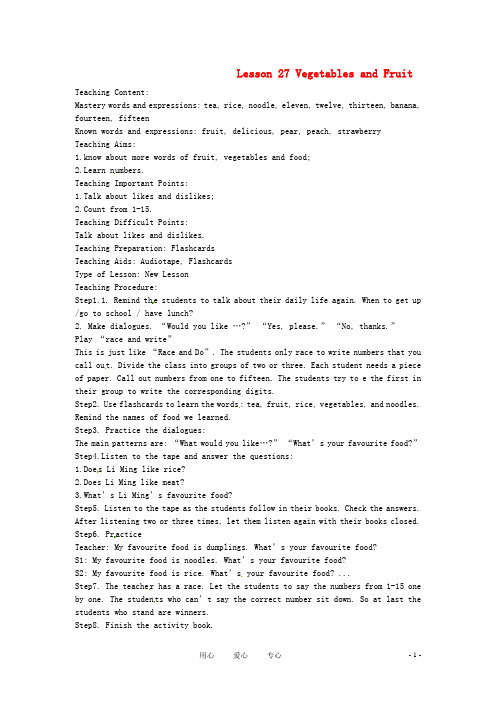
Lesson 27 Vegetables and FruitTeaching Content:Mastery words and expressions: tea, rice, noodle, eleven, twelve, thirteen, banana, fourteen, fifteenKnown words and expressions: fruit, delicious, pear, peach, strawberry Teaching Aims:1.know about more words of fruit, vegetables and food;2.Learn numbers.Teaching Important Points:1.Talk about likes and dislikes;2.Count from 1-15.Teaching Difficult Points:Talk about likes and dislikes.Teaching Preparation: FlashcardsTeaching Aids: Audiotape, FlashcardsType of Lesson: New LessonTeaching Procedure:Step1.1. Remind th e students to talk about their daily life again. When to get up /go to school / have lunch?2. Make dialogues. “Would you like …?” “Yes, please.” “No, thanks.”Play “race and write”Th is is just like “Race and Do”. The students only race to write numbers that you call ou t. Divide the class into groups of two or three. Each student needs a piece of paper. Call out numbers from one to fifteen. The students try to e the first in their group to write the corresponding digits.Step2. Use flashcards to learn the words: tea, fruit, rice, vegetables, and noodles. Remind the names of food we learned.Step3. Practice the dialogues:The main patterns are: “What would you like…?” “What’s your favourite food?”Step4.Listen to the tape and answer the questions:1.Doe s Li Ming like rice?2.Does Li Ming like meat?3.What’s Li Ming’s favourite food?Step5. Listen to the tape as the students follow in their books. Check the answers. After listening two or three times, let them listen again with their books closed. Step6. Pr acticeTeacher: My favourite food is dumplings. What’s your favourite food?S1: My favourite food is noodles. What’s your favourite food?S2: My favourite food is rice. What’s your favourite food? ...Step7. The teache r has a race. Let the students to say the numbers from 1-15 one by one. The studen ts who can’t say the correct number sit down. So at last the students who stand are winners.Step8. Finish the activity book.SummaryTalking about likes and dislikes is familiar to the students. The numbers from 11-15 are so long words. So spend more time on the numbers.Lesson 28 What’s for Breakfast?Teaching Content:Mastery words and expressions: milk, cake, egg, breadKnown words and expressions: ice cream, cereal, porridge, put, sugarTeaching Aims:1.Know about the food and drink habits in western countries.2.The similaritie s and differences between China and Canada in the daily life. Teaching Important Points:1.Learn more words about food in China and western countries.2.People in different countries have di fferent food for breakfast.Teaching Difficult Points:Patterns:1.Time for breakfast.2. I’d like porridge for breakfast.3.I put milk and sugar on it.Teaching Preparation: FlashcardsTeaching Aids: Audiotape, FlashcardsType of Lesson: New lessonTeaching Procedure:Step1.1. Remind the students to count the numbers from 1-15.2 .Let’s have a short dictation about the numbers.Step2. Use flashcards or drawings to show the food to the students. At the same time, ask questions: “Do you like this?” “Yes, I do.” “No, I don’t. I like…”Step3. Drill:Point to pictures. Teacher asks questions. Let students answer. Then the next students do this one by one.Teacher: Do you like this?S1: Yes, I do.S2: Do you like this?S3: No, I don’t. I like rice. Rice is okay. …Step4.Listen to the tape and imitate after it for several times until they can read it correctly and fluently.Step5 Listen to Part2 “Porridge or Cereal”. Answer th e following questions.1.What are Li Ming and Jenny doing?2.What would Li Ming like for breakfast?3.What does Jenny put in the cereal?Step6 Read the text loudly and check the answers. If they can’t understand “Porridge or Cereal”, the teacher uses the p ictures to help them catch the meaning.Step7 Listen again and try to imitate after it. After a while, they ca n repeat with their books closed.Step8 Read the dialogues aloud in roles on pairs. Then change the roles, practice again.Step9 Ask several volunteers to come to the front and act the dialogue out. Step10 1 Finish off the activity book.Make up new dialogues according to the text.Summa rySome patterns are difficult for students to understand. So practice is the key to grasp them.。
2024-2025学年牛津译林版英语七年级上册+Unit1培优讲义
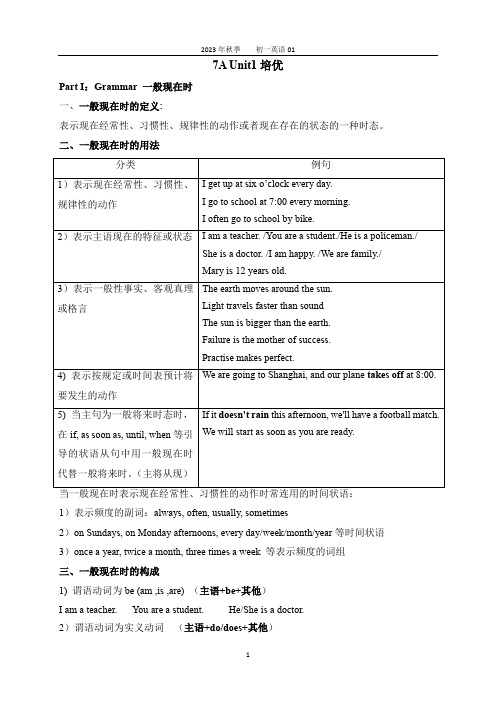
7A Unit1培优Part I:Grammar 一般现在时一、一般现在时的定义:表示现在经常性、习惯性、规律性的动作或者现在存在的状态的一种时态。
二、一般现在时的用法分类例句1)表示现在经常性、习惯性、规律性的动作I get up at six o’clock every day.I go to school at 7:00 every morning.I often go to school by bike.2)表示主语现在的特征或状态I am a teacher. /You are a student./He is a policeman./She is a doctor. /I am happy. /We are family./Mary is 12 years old.3)表示一般性事实、客观真理或格言The earth moves around the sun. Light travels faster than sound The sun is bigger than the earth. Failure is the mother of success. Practise makes perfect.4) 表示按规定或时间表预计将要发生的动作We are going to Shanghai, and our plane takes off at 8:00.5) 当主句为一般将来时态时,在if, as soon as, until, when等引导的状语从句中用一般现在时代替一般将来时。
(主将从现)If it doesn't rain this afternoon, we'll have a football match. We will start as soon as you are ready.1)表示频度的副词:always, often, usually, sometimes2)on Sundays, on Monday afternoons, every day/week/month/year等时间状语3)once a year, twice a month, three times a week 等表示频度的词组三、一般现在时的构成1) 谓语动词为be (am ,is ,are) (主语+be+其他)I am a teacher. You are a student. He/She is a doctor.2)谓语动词为实义动词(主语+do/does+其他)I like English.Mike likes English.Mike speaks good English.I go to school on foot (by school bus, by bus, by bike).Lily goes to school on foot (by school bus, by bus, by bike).Tony often watches TV in the evening.Jack always washes in cold water.Mike studies English, Chinese, Math at school.四、动词第三人称单数变化规则▲第三人称单数:he/she/it; 可数名词单数;不可数名词. 规则动词原形动词第三人称单数形式例句一般情况加-s likeenjoy likesenjoysLisa likes walking down the street and enjoysthe sunshine.以_s,_x,_ch,_sh,_o_ 结尾的动词后加-es passwashwatchfixgopasseswasheswatchesfixesgoesHe always washes in cold water.Tony often watches TV in the evening.Lily goes to school on foot every day.以辅音字母加y结尾的动词,去y加-ies studycrystudiescriesShe studies Chinese for leaning more culture ofChina.Mike studies English, Chinese, Math at school.Don’t take any notice for Nina, she always criesfor nothing.特殊形式have has Sona has musical talent.五、句型转换1、谓语动词为be动词否定:主语+be + not+其他一般疑问句:be+主语+其他(即将be提到句首)含be动词的一般现在时肯定句(我用am,你用are,is连着他她它,单数is复数are,不可数用is)He is 12 years old.否定句(be后加not)一般疑问句(be提至句首)回答肯定:主语+do/does+其他否定:主语+助动词do/does + not+动词原形+其他疑问:Do/Does+主语+其他回答:肯定:Yes,主语+do/does. 否定:No,主语+do/does + not.行为动词(主语为非第三人称单数)肯定句I like Jiaxin. 否定句:动词前加助动词don't一般疑问句:句首加助动词Do回答行为动词(主语为第三人称单数)肯定句Mike likes Jiaxin. 否定句:动词前加助动词doesn't,有助动动还原一般疑问句:句首加助动词Does回答六、初中一般现在时的重要考点:1. 经常性或习惯性的动作,常与时间标志语连用:eg: We always help each other. It often snows in winter.2.表示主语现在的特征、性格、能力等。
2021.3.27 七年级英语(讲义1:牛津7A Chapter1 friend 知识点梳
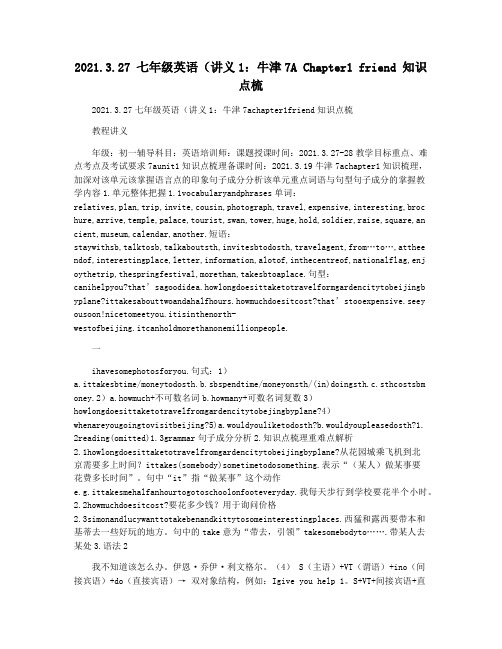
2021.3.27 七年级英语(讲义1:牛津7A Chapter1 friend 知识点梳2021.3.27七年级英语(讲义1:牛津7achapter1friend知识点梳教程讲义年级:初一辅导科目:英语培训师:课题授课时间:2021.3.27-28教学目标重点、难点考点及考试要求7aunit1知识点梳理备课时间:2021.3.19牛津7achapter1知识梳理,加深对该单元该掌握语言点的印象句子成分分析该单元重点词语与句型句子成分的掌握教学内容1.单元整体把握1.1vocabularyandphrases单词:relatives,plan,trip,invite,cousin,photograph,travel,expensive,interesting,broc hure,arrive,temple,palace,tourist,swan,tower,huge,hold,soldier,raise,square,an cient,museum,calendar,another.短语:staywithsb,talktosb,talkaboutsth,invitesbtodosth,travelagent,from…to…,atthee ndof,interestingplace,letter,information,alotof,inthecentreof,nationalflag,enj oythetrip,thespringfestival,morethan,takesbtoaplace.句型:canihelpyou?that’sagoodidea.howlongdoesittaketotravelformgardencitytobeijingb yplane?ittakesabouttwoandahalfhours.howmuchdoesitcost?that’stooexpensive.seey ousoon!nicetomeetyou.itisinthenorth-westofbeijing.itcanholdmorethanonemillionpeople.一ihavesomephotosforyou.句式:1)a.ittakesbtime/moneytodosth.b.sbspendtime/moneyonsth/(in)doingsth.c.sthcostsbm oney.2)a.howmuch+不可数名词b.howmany+可数名词复数3)howlongdoesittaketotravelfromgardencitytobejingbyplane?4)whenareyougoingtovisitbeijing?5)a.wouldyouliketodosth?b.wouldyoupleasedosth?1.2reading(omitted)1.3grammar句子成分分析2.知识点梳理重难点解析2.1howlongdoesittaketotravelfromgardencitytobeijingbyplane?从花园城乘飞机到北京需要多上时间?ittakes(somebody)sometimetodosomething.表示“(某人)做某事要花费多长时间”。
- 1、下载文档前请自行甄别文档内容的完整性,平台不提供额外的编辑、内容补充、找答案等附加服务。
- 2、"仅部分预览"的文档,不可在线预览部分如存在完整性等问题,可反馈申请退款(可完整预览的文档不适用该条件!)。
- 3、如文档侵犯您的权益,请联系客服反馈,我们会尽快为您处理(人工客服工作时间:9:00-18:30)。
第27讲期末串讲一
What is your favourite festival, Tommy? 句中favourite意为“最喜欢...”,和like...best为同意。
题一:翻译:
我最喜欢爬山。
(用两种方式)
Usually they g ive us some candy as a treat. candy是“糖果”的意思,是不可数名词,当可数名词讲时,表示“糖果的种类”。
题二:翻译:
我有五盒糖。
give sb. sth. 是常用搭配,等于give sth. to sb. 给某人某物。
题三:翻译:
我妈妈昨天给了我100块钱。
常见可接双宾语的动词有:
send sb. sth. = send sth. to sb
lend sb. sth. = lend sth. to sb.
buy sb. sth. = buy sth. for sb.
bring sb. sth. = bring sth. for sb.
All my family get together and have a big di nne r.
get together是“聚会,联欢”的意思。
题四:翻译:
我的朋友们每年都要聚会去野餐。
We knock on their doors and shout “trick or treat”.
knock on是“敲门,窗户”的意思,和knock at 同义。
常考knock短语有:
knock off knock out
knock-out knock down
特殊疑问词的使用
What:什么(activity or thing)
Which:哪个(thing or person)
Who:谁(person)
whose:谁的(possession)
When:何时(time)Where:何地(place)
Why:为什么(reason)
How:如何(way of doing things)
题五:对画线部分提问:
1.I can see eight birds in the box.
2.My father is fine toda y.
3.Liu Tao is playing football in the playground.
4.The gi rl with big eyes is my sister’s friend.
5.My birthday is on the 9th of September.
They have too much sugar and are bad for my teeth.
辨析:
too much too many much too 题六:翻译:
1.假期人太多了,我不想出门。
(on holidays)
2.你知道的比我更少。
How often do you exercise?
你多长时间锻炼一次?
how often意为“多久一次”,用来询问频率。
常和how搭配的特殊疑问词有:
how many how much how old
how long how far how tall
how soon
题七:翻译:
1.你多久去一次超市?
2.你家离学校有多远?
3._________ do you play computer games with your father every night?
A. How often
B. How much
C. How far
D. How long It’s good for our health.
be good for be good at be good to
题八:1.Xiaoming is very kind-hearted, and he is always _________ the old.
A. be good to
B. be good at
C. be good for
D. be good in 翻译:
2.你应该多吃点蔬菜,保持身体健康。
可数名词和不可数名词
不可数名词是指不能以数目来计算的东西;它一
般没有复数形式,只有单数形式,它的前面不能
用不定冠词a / an,若要表示它的个体意义时,一般要与一个名词短语连用。
可数名词是指可以用数目来计算的人或物。
有单
数和复数形式。
单数名词变复数名词的规则:
特殊变化:man,foot,tooth,child,fish,sheep等。
题九:翻译:
一张纸一盒巧克力
一瓶绿茶一滴血
They are___________.
A. woman teacher
B. women teachers
C. women teacher
D. woman teachers
第27讲期末串讲(一)
题一:I like climbing best./Climbing is my favorite sport.
题二:I have five boxes of candy.
题三:My mother gave me a hundred yuan yesterday./ My mother gave a h undred yuan to me yesterday.
题四:All my friends get together to have a picnic every year.
题五:1.What can you see in the box?
2.How is your father today?
3.Where is Liu Tao playing football?
4.Which girl is your sister’s friend?
5.When is your birthday?
题六:1.There are too many people on holidays, so 2.I don’t want to go out. 3.Y ou know less than me.
题七:1.How often do you go to the supermarket?
2.How far is your home from the school?;
3.D
题八:1.A; 2.You should eat more vegetables to keep fit.
题九:a piece of paper; a box of chocolate; a bottle of green tea; a drop of blood; B。
